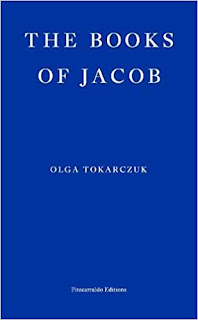The author's incredible effort to create a universe, 900 pages long, full of detail and coherent, well-paced, rich in style and full of different perspectives, requires the same effort from the reader. Superficial or quick reading will not work. As the reader, you have to submit yourself to the work, become part of it to the extent that it will be high on your mind for the period it takes to read it till the end.
The story is about the real person called Jacob Frank, who lived in Poland in the 18th Century. He was the leader of a jewish sect, and he proclaimed to be the Messiah, and he converted to the catholic faith to demonstrate that he was the bridge between all abrahamic religions. The fact that a jewish community was willing to convert to christianity obviously served the agenda of the Polish catholic church, some secular leaders, while leading to the ex-communication by the jewish community.
I have applauded Olga Tokarczuk's writing before, especially the brilliant "Flights", which received a 5-star rating, but this novel is even better. Tokarczuk must have researched this book for many years in order to provide such a complete picture of all that happened during Jacob Frank's life, even if this novel is not a historical novel in the purest sense. It's a literary work of art, and her angle of approach is to create dozens of perspectives in the stories and the lives of the people who girate around Frank. Frank's perspective, even if he is the book's protagonist, is only given succinctly, and rarely. All information we get is indirect, which makes his presence more abstract, mythical, legendary, full of contradictions.
It's a novel about the human condition, about people struggling with their poverty, their friendships, their beliefs, their hunger for power, their allegiances, their lusts, their love and their fears. The myriad of stories leads to a kaleidoscopic view of what actually happened, sometimes clarifying, often obfuscating.
What makes this an absolutely brilliant novel:
- the knowledge: as mentioned, an extremely well-researched book, full of real-life figures, but also about the little facts of life during 18th century Poland: the food, the living conditions, travel, world views, and then especially the jewish literature of Talmud, Kabbalah and Zohar. Tokarczuk does not explain or describe or educate us on all these topics. No, they are just part of the background, unexplained often but present as if a given.
- the writing: like many good authors, the pleasure of writing is palpable in almost every sentence. Nothing is cheap or fast or hurried. Every character's story has its own style, its own approach, its own language even. Some characters only come to life through the letters they write to each other, others tell their story in the first person, some others in the third, and in some stories you get stories within stories, with diary scraps interspersing the rest of the narrative.
- the humanity: just like in "Flights" and other novels by her, there are no real bad guys. She has a tremendous empathy for each character, understanding their motivation and behaviour, while at the same time taking a wise distance, slightly humouristic mocking over the absurdity or the all too human actions that take place. It's a book about moral choices, about indoctrination and tolerance, about open-mindedness and self-preservation, about narcissism and altruism. And to the author's credit, she does not judge, she does not take the moral highground, she leaves every character with its own beliefs, doubts and consequences.
- the creativity: or maybe I should say the smart and intelligent way she presents things, the offering of obvious things through a different lens, including the Garcia Marquez-like magic realism of Yente, the old woman who is not dead but neither alive, who found her last resting place in a cave, and who watches everything that happens knowingly, including the thoughts and feelings of the book's characters.
- the coherence: despite the book's length, and despite its dozens of perspectives, its geographic spread from Germany to Turkey, its chronological span over several generations, the quality of the writing is maintained till the very end, as is the perfect composition of the book. Tokarczuk does not guide the reader through her universe. You are thrown in, and like in Pynchon "Gravity's Rainbow", you have to work your way through it, trying to find out what's actually happening and how or if it makes even sense.
I could add some more categories of why this novel exceeds many of the books I've read in my life.
It's massive, it's brilliant, it's unique.
It's also right to give kudos for Jennifer Croft for the translation.



















